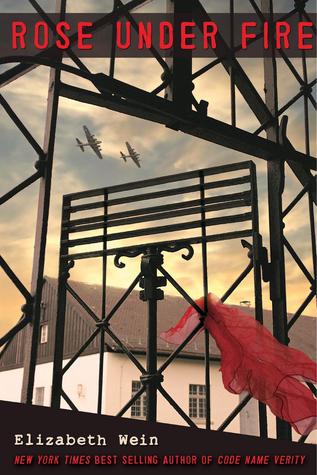
Rose Under Fire | October 1, 2014
by Elizabeth Wein (Disney Hyperion, 2013)
Rose Justice is an American civilian pilot who ferries damaged airplanes, other pilots, and spies between airbases. She likes being a part of the war effort on the European front, but loves being a part of a crowd even more. When Rose isn’t flying, she hangs out with her best friend, Mattie Brodatt, and goes on dates with her fiancé. Rose’s world of flying and socializing dissolves the moment she is captured by Nazi fighter planes during one of her missions. Shortly after arriving at Ravensbruck, a women’s concentration camp, Rose is adopted into a “family” made of French, Polish, and Russian prisoners. One of Rose’s new sisters, Roza, is a “rabbit,” one of the girls used for medical experiments. As time passes and the Nazi guards begin to fear the Allies’ invasion, the death count in Ravensbruck increases. Suddenly, all of the rabbits are scheduled for “termination” and everyone guesses that the doctors are trying to erase all evidence of the medical experiments. Rose will have to dig deep into her reserves of strength and courage now if she is to save Roza…and herself.
I fell in love with Elizabeth Wein’s first novel, Code Name Verity, and was therefore excited to read her new novel. Rose Under Fire is set in the same world and era as Code Name Verity but is a companion novel rather than a sequel. I enjoyed seeing some familiar faces from the previous book and was happy to be re-immersed in the life of a civilian ATA pilot; I also appreciated that the story is told in a similar diary format as Code Name Verity. However, after Rose is captured, the story departs from its predecessor entirely and focuses on Rose’s life in the concentration camp. I personally don’t read many Holocaust stories, but even I can tell that this novel is unique in its approach to the topic. While traditional facts like shaving the prisoners’ heads and assigning them numbers are included, Elizabeth Wein primarily focuses on incorporating lesser-known accounts into the narrative, like the medical experiments at Ravensbruck and some of the odd jobs that prisoners were forced to do. I had always assumed that Nazi concentration camps only held Jewish prisoners, but Rose Under Fire made me consider the French, Polish, Russian, and American prisoners in the war as well. Ultimately, the historical content in this book is fresh and helps to create a realistic and detailed world.
Besides the historical content, a major driving force behind the novel is the strong bond that Rose forms with her fellow prisoners. I was constantly inspired by the women’s sense of loyalty to one another and the many ways they found to fight back against their captors and situation. I was always rooting for them and, despite it being a Holocaust book, was never without a sense of hope. Lastly, I love the story’s overarching message about the power of writing. While in the camp, Rose sometimes uses poetry to remember the names of the dead rabbits, to describe what she feels and experiences, and to barter for items that her cell block needs. Roza also constantly reminds Rose that she must use her writing one day to tell the outside world about what happened to the rabbits and prisoners at Ravensbruck. In this sense, Rose’s writing is both a tie to humanity and a tool for conveying an important message. And isn’t that what we want all books to be?
Overall, I highly recommend Rose Under Fire. It’s perfect for lovers of historical fiction, as well as readers who are just looking for a book with emotion, high stakes, and strong characters. And it’s good as both a companion novel and a stand-alone.
 Learn more about this title
Learn more about this title








